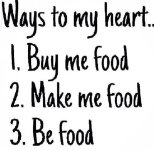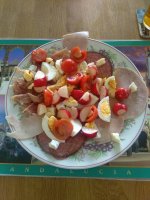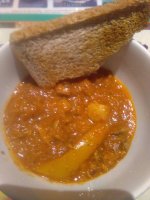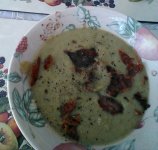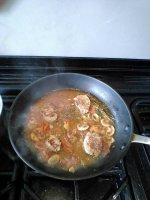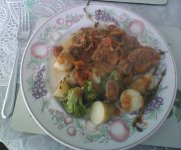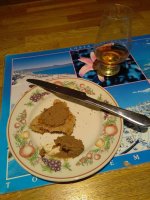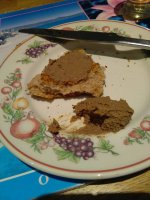-
Features
-
Friends of IIDBFriends Recovering from Religion United Coalition of Reason Infidel Guy
Forums Council of Ex-Muslims Rational Skepticism
Social Networks Internet Infidels Facebook Page IIDB Facebook Group
The Archives IIDB Archive Secular Café Archive
You are using an out of date browser. It may not display this or other websites correctly.
You should upgrade or use an alternative browser.
You should upgrade or use an alternative browser.
Foodie Thread
- Thread starter Potoooooooo
- Start date
Underseer
Contributor
As I get older, my spice tolerance seems to diminish (Korean-Americans lied to me!). I love spicy food more than ever, but I find myself enjoying milder amounts of spice instead of always trying to set my palate on fire like I did when I was younger. When I cook with fresh chili peppers these days, it's always jalapenos, and never anything spicier like Serrano or habanero.
So when the fad of super-hot hot sauce hit, I ignored it. Had this fad happened in my youth, I would have been deliriously happy, but it happened as I was older, so I ignored it and discovered that I actually like Frank's brand hot sauce (which I dismissed as too wimpy when I was younger).
What changed is that I got hooked on watching the show Hot Ones on First We Feast on YouTube:
https://www.youtube.com/user/FirstWeFeast
Example:
It's a brilliant series. Do check it out.
Anyway, because I watched so many interviews on Hot Ones, I went out and stood in the fancy-schmancy hot sauce section at the local supermarket and picked out a bottle of ghost pepper hot sauce. Needless to say, I can't add more than 3 or 4 drops do any individual portion dish, but in experimenting with it, I made a happy discovery.
See, I love Buffalo wings. Can't get enough of them.
The problem is that when you buy Buffalo wings, they always change the heat level of the wings by adjusting the ratio of butter to hot sauce. So if you get the extra hot wings from your local sports bar, there's no butter flavor to the wings. The ghost pepper sauce solved that problem. I can make Buffalo wing sauce that is almost entirely butter with only a few drops of ghost pepper sauce (and some regular vinegar-based hot sauce so that I still get the vinegar flavor). That way I get intense heat and a strong butter flavor in my Buffalo wings.
So when the fad of super-hot hot sauce hit, I ignored it. Had this fad happened in my youth, I would have been deliriously happy, but it happened as I was older, so I ignored it and discovered that I actually like Frank's brand hot sauce (which I dismissed as too wimpy when I was younger).
What changed is that I got hooked on watching the show Hot Ones on First We Feast on YouTube:
https://www.youtube.com/user/FirstWeFeast
Example:
It's a brilliant series. Do check it out.
Anyway, because I watched so many interviews on Hot Ones, I went out and stood in the fancy-schmancy hot sauce section at the local supermarket and picked out a bottle of ghost pepper hot sauce. Needless to say, I can't add more than 3 or 4 drops do any individual portion dish, but in experimenting with it, I made a happy discovery.
See, I love Buffalo wings. Can't get enough of them.
The problem is that when you buy Buffalo wings, they always change the heat level of the wings by adjusting the ratio of butter to hot sauce. So if you get the extra hot wings from your local sports bar, there's no butter flavor to the wings. The ghost pepper sauce solved that problem. I can make Buffalo wing sauce that is almost entirely butter with only a few drops of ghost pepper sauce (and some regular vinegar-based hot sauce so that I still get the vinegar flavor). That way I get intense heat and a strong butter flavor in my Buffalo wings.
Potoooooooo
Contributor
Arabian delicacy roasted camel's hump






Just made some hummus with this recipe, except I used peanut sauce instead of tahini. So good!
Thomas II
Contributor
I love beet pickled eggs! I haven't had one since I was a kid.
How do they taste?
I love beet pickled eggs! I haven't had one since I was a kid.
How do they taste?
Pickled! But on the inside, like hard boiled eggs.
Underseer
Contributor
- Save the pickle juice when you use up a jar of pickles.
- Add shredded carrots to the pickle juice. (I also added sugar, fresh garlic, and crushed red pepper flakes.)
- Leave in 'fridge for a week or so.
Voi la! pickled carrots for your sammiches.
Just one more cracker and hummus and then I'm done. Just one. OK one more. and maybe one more after that. Good shit. Black bean hummus I just made. No pita or naan to go with it but crackers or toast work just fine.
NOM. Thanks, totally gonna try that. I love picked stuff!
- Save the pickle juice when you use up a jar of pickles.
- Add shredded carrots to the pickle juice. (I also added sugar, fresh garlic, and crushed red pepper flakes.)
- Leave in 'fridge for a week or so.
Voi la! pickled carrots for your sammiches.
NOM. Thanks, totally gonna try that. I love picked stuff!
By the way, if you don't have tahini or satay sauce, a spoonful of peanut butter works in a pinch for hummus.
DrZoidberg
Contributor
IanSYK
Half Way Between
IanSYK
Half Way Between
IanSYK
Half Way Between
IanSYK
Half Way Between
Are there any real health benefits to eating vinegary foods? Googling mainly just gives me Dr. Oz and other bullshit about magical apple cider vinegar.
beero1000
Veteran Member
Are there any real health benefits to eating vinegary foods? Googling mainly just gives me Dr. Oz and other bullshit about magical apple cider vinegar.
It's not magical, but there may be some benefits.
From 2006:
https://www.ncbi.nlm.nih.gov/pmc/articles/PMC1785201/ said:For more than 2000 years, vinegar has been used to flavor and preserve foods, heal wounds, fight infections, clean surfaces, and manage diabetes. Although vinegar is highly valued as a culinary agent, some varieties costing $100 per bottle, much scrutiny surrounds its medicinal use. Scientific investigations do not support the use of vinegar as an anti-infective agent, either topically or orally. Evidence linking vinegar use to reduced risk for hypertension and cancer is equivocal. However, many recent scientific investigations have documented that vinegar ingestion reduces the glucose response to a carbohydrate load in healthy adults and in individuals with diabetes. There is also some evidence that vinegar ingestion increases short-term satiety. Future investigations are needed to delineate the mechanism by which vinegar alters postprandial glycemia and to determine whether regular vinegar ingestion favorably influences glycemic control as indicated by reductions in hemoglobin A1c. Vinegar is widely available; it is affordable; and, as a remedy, it is appealing. But whether vinegar is a useful adjunct therapy for individuals with diabetes or prediabetes has yet to be determined.
Ah, thanks. 
Underseer
Contributor
Tried recreating something I found at a "Chinese" buffet. It turned out pretty good.
A while back I made homemade tonkatsu, but only used a quarter of the head of cabbage, so I've been coming up with ways to use up the rest of the cabbage. There's only so much cole slaw I'm willing to eat.
- Cabbage (cut into thick one inch strips)
- Dried red pepper (they used whole red pepper, I had flakes on hand so that's what I used)
- Salt
- Garlic
- Aji mirin (just a teeny bit for a slight sweetness, substitute any other sweet thing you like but use only a smidge)
- Chinese chili oil (my own addition, not in the original)
A while back I made homemade tonkatsu, but only used a quarter of the head of cabbage, so I've been coming up with ways to use up the rest of the cabbage. There's only so much cole slaw I'm willing to eat.
bilby
Fair dinkum thinkum
- Joined
- Mar 6, 2007
- Messages
- 40,321
- Gender
- He/Him
- Basic Beliefs
- Strong Atheist
It's not magical, but there may be some benefits.
From 2006:
https://www.ncbi.nlm.nih.gov/pmc/articles/PMC1785201/ said:For more than 2000 years, vinegar has been used to flavor and preserve foods, heal wounds, fight infections, clean surfaces, and manage diabetes. Although vinegar is highly valued as a culinary agent, some varieties costing $100 per bottle, much scrutiny surrounds its medicinal use. Scientific investigations do not support the use of vinegar as an anti-infective agent, either topically or orally. Evidence linking vinegar use to reduced risk for hypertension and cancer is equivocal. However, many recent scientific investigations have documented that vinegar ingestion reduces the glucose response to a carbohydrate load in healthy adults and in individuals with diabetes. There is also some evidence that vinegar ingestion increases short-term satiety. Future investigations are needed to delineate the mechanism by which vinegar alters postprandial glycemia and to determine whether regular vinegar ingestion favorably influences glycemic control as indicated by reductions in hemoglobin A1c. Vinegar is widely available; it is affordable; and, as a remedy, it is appealing. But whether vinegar is a useful adjunct therapy for individuals with diabetes or prediabetes has yet to be determined.
That's a LOT of words to say "It probably does nothing; Certainly anyone who tells you it cures something cannot possibly be certain that they are right, and is probably wrong".
Well, as long as it's not hurting me, I"ll keep eating it.

